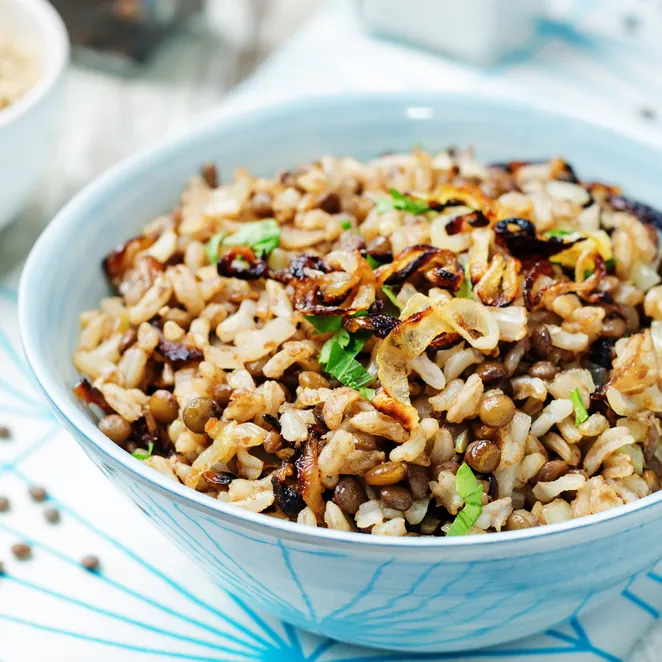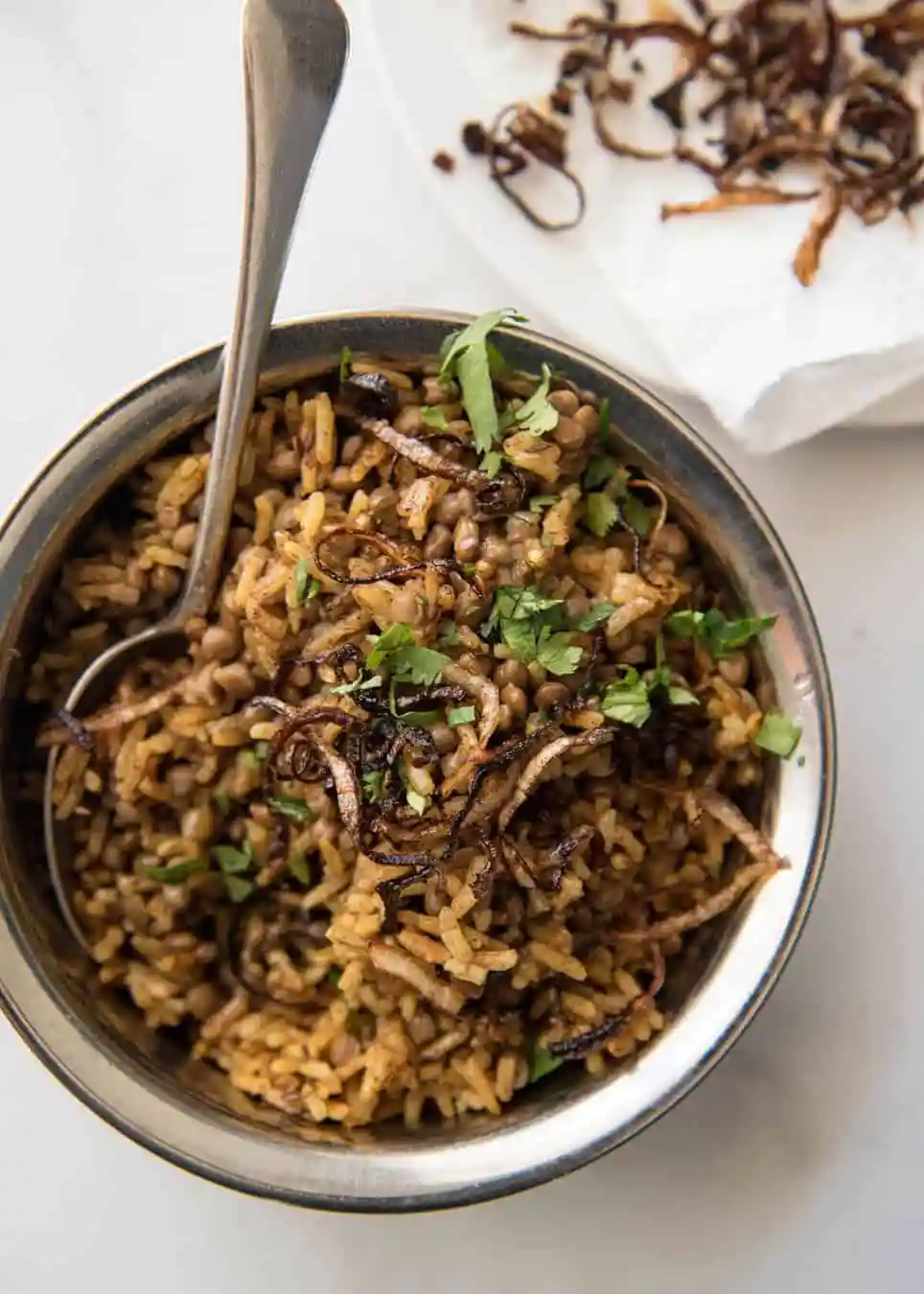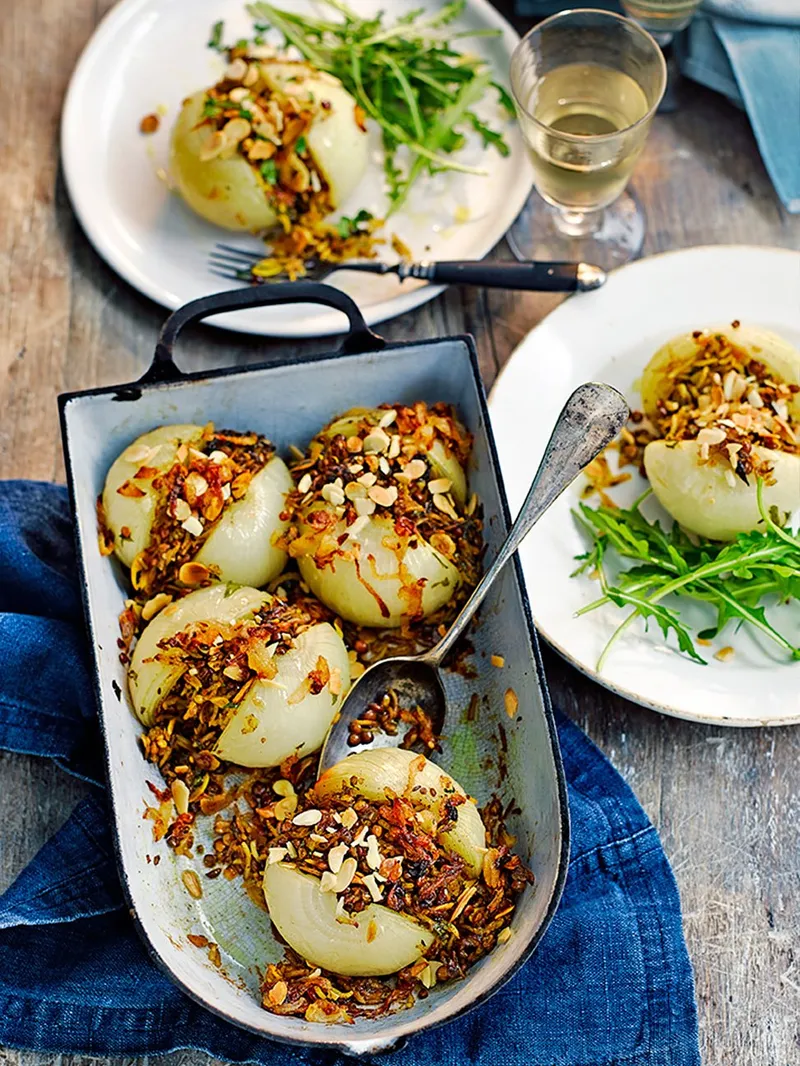M'jadrah - the smell of onions
- rosemary
- Mar 27, 2024
- 6 min read
"the dish far surpasses the sum of its parts—who knew such humble elements could taste so dynamic?" Kate Williams/Serious Eats

I am attempting to have a ruthless clear out. I have folders of recipes collected from here and there and truth to tell I hardly ever look at them. So I have started going through them to see what to retain and what to throw. It's a pretty useless exercise really because when it comes to it I can't bear to throw many of them out, even if I know I shall never make the dish in question - maybe because of a pretty picture, maybe because of a sentimental attachment to where it is from. Some are handwritten and therefore precious. Moreover where there is now a space in the folder I often fill it with a more recently torn out recipe.
It's also, however, a useful inspiration creator, and this is what I have alighted on today for 'the treatment' - M'jadrah in a recipe from Cath Claringbold in a long ago article in Good Weekend - The Age's weekend magazine, which we no longer get. And I as I searched for supplementary material I did, as often I do these days, have the nasty feeling I have done this before. But I know I haven't started in the same place, and I also know that I have not yet cooked this dish, so maybe it's new to the blog too. Anyway here I go. And I'll begin with the smell of onions which arises naturally from the topic of the dish in hand. Especially when it comes to Ottolenghi as it inevitably will. More later.
Cath Claringbold opened her article - which was really about caramelised onions - with a story about a busy housewife, which emphasised the power of the smell of onions:
"Her husband was a cantankerous man who expected dinner on the table when he arrived home from work every night but, juggling the kids and the responsibility of running the household, she often fell behind schedule. On those days she would quickly fry some onions when her husband was due home - the smell was so seductive that he would feel confident dinner was on the way and she could slip a drink into his and hand and buy herself more time." Cath Claringbold/Good Weekend
Then as I searched for a picture to represent that smell I came across a rather lovely article in The Observer by Danny Wallace about the feelings evoked by the smell of onions. The quote below the picture sums it up:

"What we overlook is that the smell of frying onions – as they brown, as the sugars come free, as they soften – is much more than a smell.
It’s a scene-setter. It’s a statement of intent. It’s the signifier that good things are coming your way.
It’s the first elongated note in an arena as the guitarist walks on and the huge crowd cheers and you know the rest of the band are coming.
It’s the groundwork and the paperwork done. It’s the propellers starting and the trip beginning.
Now – powered – we can fly anywhere we choose. To India. France. To Morocco.
The smell of frying onions is the smell of potential." Danny Wallace/The Observer
It seems almost universal - and yet. My sister hated onions as a child - not now - and so presumably she hated the smell as well, and maybe many people do hate the smell. Maybe it reminds them of poverty and hard times. But yes, let's face it, what is more tempting than the smell of frying onions outside Bunnings on a Saturday?
It turns out that today's dish is one of those variously spelt and basic Middle-Eastern dishes that is a feature of every household and beloved by all - those who grew up with it and those who have recently discovered it via the expansion of our knowledge of the food of the Middle-East. And so there are a myriad of recipes on the net. Fundamentally it's a simple dish of rice and lentils with Middle-Eastern spices which doubtless change from household to household, and - here is the connection to the small of onions - masses of caramelised onions, half of which are stirred into the lentils and rice, and half of which are scattered on top.
Now obviously you can buy a jar of caramelised onions or you can make them yourself, and it's very satisfying. I have now managed to do it a couple of times, but yes it takes ages. If you do it on the cooktop. there is also the danger of burning it. I once made them in the oven and that was rather easier I thought. Cath Claringbold however, has another solution:
"I make my caramelised onions in the microwave - and they are sensational. They require little effort and are so delicious that I keep finding new uses for them. I just put three large, finely sliced red onions, two thinly sliced birdseye chilies, sea salt and a generous slurp of olive oil in a glass microwave dish with a lid and a steam release. I put the lid on and microwave on high for 15 minutes, then remove and stir before putting the dish back in for 4-5 minutes. The onions come out golden and slightly jammy." Cath Claringbold/Good Weekend
Maybe I should try that some time. I certainly soften them in the microwave sometimes for a quiche.

But back to our Mejadra (the spelling that Ottolenghi uses) and which one of the other great Middle-Eastern gurus - Greg Malouf whose version which he calls Lebanese dirty rice is shown here - describes as "THE quintessential rice dish of the Middle East", and in his opinion the reason for this is that:
"Just about every country around the region has a version of this dish because they understand the value of boosting the protein value of rice with lentils."
Somebody described his version as posh, although I think it is pretty similar to all the other versions I found, other than the 'posh' garnish of rose petals.

But of course I first looked for an Ottolenghi version and, also of course, there it is in The Guardian where it is called Mejadra, and is looking half-eaten. The fact that it was topped with soft fried onions was made much of, although it seems to me that most versions do indeed have a topping of onions, whether crispy or just caramelised. Being Ottolenghi, lots of people have given his recipe a go - here are three of them: Kate Williams on the Serious Eats website, who uses the original photograph from Jerusalem; Dish 'n' the Kitchen, the writer of Luna Café who calls it Almost Yotam Ottolenghi’s Mejadra (Spiced Rice & Lentils) and an 'Ottolenghi inspired' version from delicious.uk
Almost all of them commented on the time it took to caramelise those onions and some tweaked a bit, with the writer of Luna Café saying:
"the flavors and textures in this dish practically scream for currants and toasted nuts, so those are now options." Luna Café
I was particularly impressed, however, by how many of the less professional bloggers commented that the dish was now a regular component of their family meals.
Then there are those with their own versions - ie. Claudia Roden - of course you have to include her in the mix, with her Mujadara which comes from her Book of Jewish Food, and also Nagi Maehashi of Recipe Tin Eats who seems to have a go at almost every classic dish out there which she calls Middle Eastern Spiced Lentil and Rice (Mejadra) and includes a 'make-do' tip:
"if you don’t have time, a near perfect substitute is store bought crunchy Fried Shallots which nowadays you can purchase from the Asian section of most grocery stores." Nagi Maehashi
And a final word from Kate Williams of Serious Eats, on those onions, which, it does seem to me are the whole point of the dish:
"It may seem strange to stir crisp fried bits into a steaming hot pot of rice, but the lost crunch factor is totally worth it considering the incredible depth of caramelized, salty flavor given over to the rice and beans. And never fear, fried-fiends, you'll reserve some of the fried onions for topping off your bowl anyway." Kate Williams/Serious Eats
Outliers? Of course. The first two are relatively simple variations that just use grains instead of the lentils - Mejadra freekeh from Danya Weiner, Deanna Linder/SBS and Bulgur Mejadra (Mjaddarat el Burgul) from Sami Tamimi - Ottolenghi's business partner and co-writer of Jerusalem. This version is from Tamimi's own book Falastin. Last of all, the irrepressible Jamie Oliver, who seriously meddles with the concept in his Roast mejadra onions

It's a pretty cool and miserable day today, the sort of day that would seriously tempt you into making this dish and I would, except I've already planned pizza. Maybe later in the week for my shot at vegetarianism for the week. I'll let you know and I might give the caramelised onions in the microwave trick a go some time soon, although I have to say the oven version worked really well. It came from the first OTK book - Shelf Love and was from the recipe for (All the) herb dumplings with caramelised onions. A five star vegetarian dish in our house. Give that a go sometime soon.


















The smell of onions on the barbecue, almost certainly burnt but signifying of wonderful things to come. Now isn’t that strange!